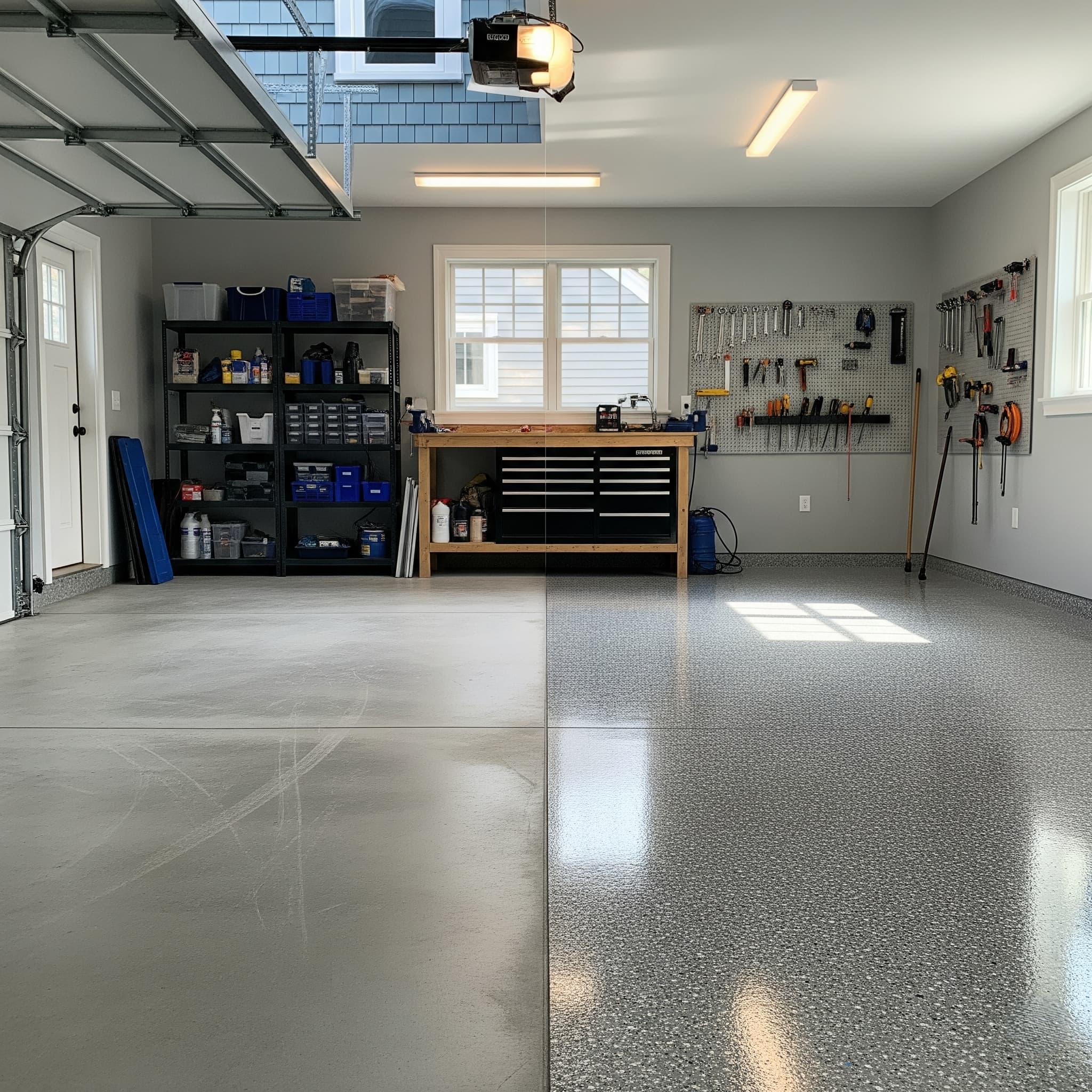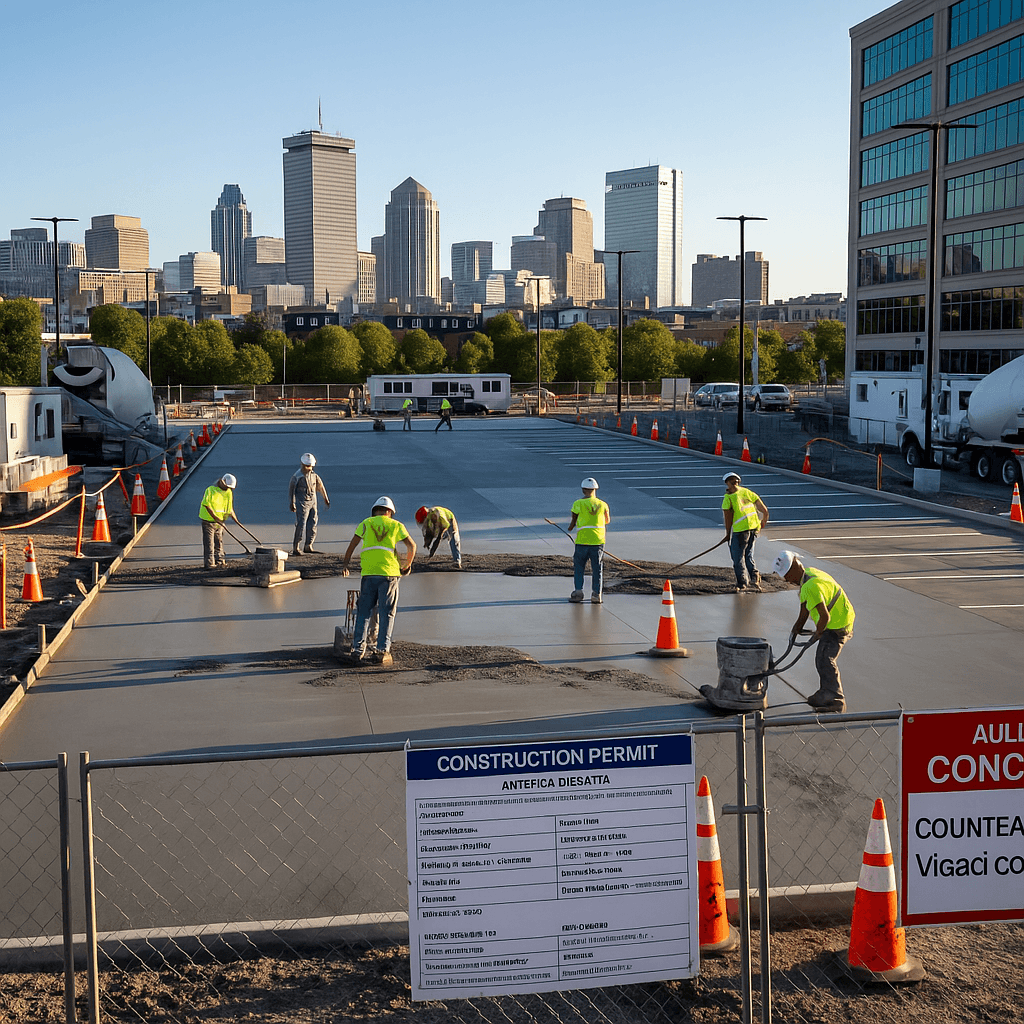
What Questions Should I Ask Local Concrete Contractors in Boston
Pouring Concrete Boston
Boston’s complex environment and urban design elements require special knowledge for successful concrete pouring. Whether it is a residential driveway in Cambridge or a commercial foundation in the Financial District, using proper techniques will give you a strong and lasting result. We have poured many tons of concrete in the Boston area over decades and understand the needs of everything from old, historic Beacon Hill brownstones to new Seaport District developments.
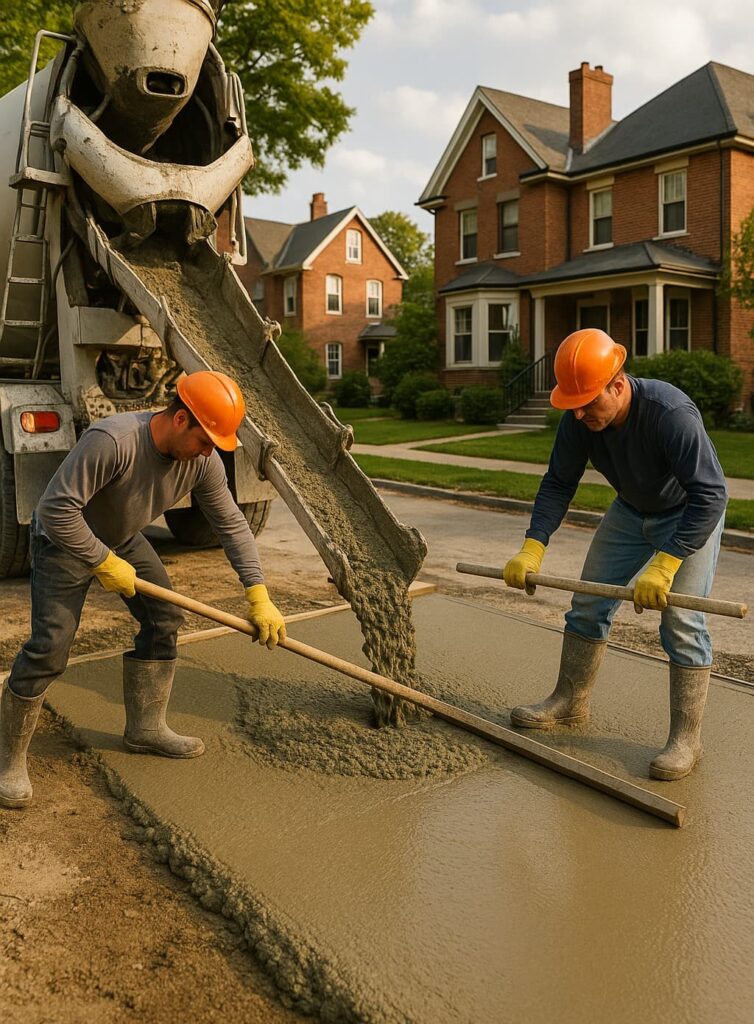
Understanding the Concrete Pouring Process
There is a lot to consider when it comes to pouring concrete, as it is more than just a combination of cement and water. Successful concrete pouring requires careful planning, precise timing, and expert execution to provide the best possible results. For this reason, in Boston’s varied climates, successful concrete pouring must be able to take into account temperature fluctuations, seasonal influences, and specific project types.
Factors Involved in Professional Concrete Pouring
The success of a pour of concrete will depend upon several key elements:
- Appropriate mix designs selected for Boston’s freeze-thaw cycle
- Timely coordination with weather conditions and delivery schedules
- Correct site preparation to ensure a stable base for all of Somerville
- Equipment is ready to go for pouring, leveling, and finishing concrete
- Continuous quality control to monitor both consistency and strength development
Preparation Before Pouring Concrete in Boston
Preparation is critical before pouring concrete in any Boston neighborhood:
Site Assessment and Planning
Before you start to pour concrete in any neighborhood in Boston, the following steps should be taken:
Base Preparation (Foundations and Bases)
- Verification of excavation to confirm the correct depth and grade for all of the projects in Jamaica Plain
- Compacting of the substrate to establish a solid base for the placement of the concrete
- Preparation of drainage for basement pours in North End properties
- Protection of underground services from utility marking and encroachment
Weather Monitoring
- Tracking the temperature for curing of the concrete in the New England climate
- Forecasts of precipitation to avoid pouring concrete during stormy conditions
- Wind considerations for both surface finishing and curing rates
Seasonal Timing
Selecting the optimal time for pouring concrete for the best results.
Materials Preparation and Quality Control
The materials used for the concrete pour must be properly prepared and monitored:
- Confirmation that the concrete mix has been verified to meet the specifications of the project
- Coordination of the delivery of the concrete, so that the concrete does not set before it is placed
- Positioning and staging of the necessary equipment to efficiently perform the operations of pouring the concrete
- Establishment of safe working zones and other safety precautions
Techniques Used for Pouring Concrete for Specific Applications
Residential Concrete Pouring
Pouring concrete for homes in Boston must be done with an emphasis on the residential requirements:
Driveway Installation
- Pouring in sections to manage large areas of driveways to be poured in manageable pieces
- Placement of joints to prevent random cracking in a residential driveway in Cambridge
- Achieving proper texture and a drainage slope in the surface finish of the driveway
- Protection of the curing of the concrete to allow for strength development under various weather conditions
Patio and Walkway Projects
- Considerations of decorative finishes when pouring concrete with stamped patterns
- Maintaining a level to provide the proper slope while also providing the design features of patio and walkway projects
- Planning for the integration of new concrete with existing Charlestown hardscaping
- Compliance with accessibility standards for proper grades and the transition between existing surfaces and new concrete
Commercial Concrete Pouring
Commercial concrete pouring projects require more sophisticated techniques:
- Coordinating a high volume of deliveries of concrete from multiple trucks
- Use of a pump to deliver concrete to remote areas in dense Boston neighborhoods
- Monitoring of quality to ensure the consistency of pour areas
- Management of the schedule to coordinate with other construction trade activities
Seasonal Considerations for Pouring Concrete in Boston
Spring Concrete Pouring
The best conditions for many of the Boston concrete pouring projects:
- Temperate temperatures are ideal for hydration and the strength gain of the concrete
- Less precipitation means fewer weather-related delays
- More stable soil due to reduced frost-heave settlement in the Newton area
- Longer days mean more time available to perform complex pours
Summer Concrete Pouring Challenges
Hot-weather pouring of concrete requires special techniques:
- Temperature control to prevent rapid setting of the concrete in the hot July temperatures
- Control of hydration to maintain the workability of the concrete during placement
- Protection of the surface to prevent rapid moisture loss during the curing process
- Adjustments to timing to pour the concrete at cooler morning or evening hours
Fall Concrete Pouring Advantages
Best conditions for pouring concrete before winter:
- Consistent temperatures for the curing of the concrete
- Low humidity to reduce surface moisture issues
- Availability of contractors to provide better scheduling options
- Preparation for spring by completing projects before winter weather impacts the ability to complete them
Winter Concrete Pouring Considerations
Pouring concrete in cold weather requires specialized approaches:
- Protection of the temperature to keep the concrete above freezing during curing
- Use of heating systems to warm the concrete and the surrounding environment
- An extended curing period to allow for additional strength-development periods
- Monitoring of the weather to avoid pouring concrete during extreme weather events
Tools and Equipment Needed for Professional Concrete Pouring
Systems for Delivering Concrete
Effective pouring of concrete depends upon the use of the proper systems for delivery:
Ready-Mix Trucks
- Standard delivery for residential projects that have easy access in Boston
- Planning of the capacity to coordinate multiple loads for large pours
- Precision in timing to prevent the concrete from setting before the completion of placement
- Verification of access to determine if the truck can reach the pour location
Systems for Pumping Concrete
- Boom pumps to reach over obstacles in tight spaces in the North End
- Line pumps to deliver concrete through hoses to remote locations
- Specialized equipment to address unique access challenges throughout Boston
Tools and Equipment for Placement and Finishing
Professional concrete pouring requires specialized equipment for placement and finishing:
- Screeds and floats to achieve the proper surface levels and textures
- Vibrators to consolidate the concrete and remove air pockets
- Tools for finishing to create the desired surface texture and pattern
- Equipment for curing to protect the concrete during the development of its strength
Assessment of Quality During Concrete Pouring
Successful concrete pouring requires continuous quality assessments:
- Testing of the slump to verify the consistency and workability of the concrete
- Monitoring of temperature to ensure optimal hydration conditions
- Verification of air content to ensure proper freeze-thaw resistance
- Sampling of strength to document the performance characteristics of the concrete
Standards for Installation
Boston Concrete Works adheres to the highest standards of installation for concrete pouring:
- Verification of thickness to ensure sufficient structural capacity
- Uniformity of the surface to provide a consistent appearance and texture
- Execution of joint timing and placement to prevent defects
- Compliance with curing protocols to ensure the development of the strength of the concrete
Challenges in Pouring Concrete in Boston
Construction Constraints of Urban Environments
Pouring concrete in Boston’s urban environments presents unique challenges:
- Access constraints requiring specialized equipment for pouring and placing in Back Bay and other narrow lots in Boston
- Consideration for neighbors to minimize disruption during the pouring and placement of concrete
- Coordination of traffic to manage the delivery of concrete and other materials on busy Somerville streets
- Compliance with permits to ensure that all of the activities of pouring and placing concrete meet local regulations
Weather-Related Issues
The unpredictable weather of New England creates specific challenges for pouring concrete:
- Flexibility in scheduling and techniques due to rapidly changing weather conditions
- Transition periods between seasons, where the weather is unstable, and the risk of weather-related delays is high
- Protection of the concrete from precipitation damage during placement and curing
- Adapting techniques to address extreme temperatures and weather conditions
Obstacles Created by Site-Specific Conditions
Each concrete pouring project may present unique site-specific conditions:
- Geological variations in soil conditions throughout the Boston area
- Careful planning to address the presence of existing structures, foundations, and utilities
- Complexities of grade, to achieve the proper drainage while addressing design requirements
- Preservation of historic sites while conducting construction activities in a sensitive manner
Post-Pouring Care of the Concrete
Immediate Post-Pouring Concrete Care
It is extremely important to properly care for the concrete immediately after it is poured:
- Protection of the surface to prevent rapid moisture loss during the early stages of curing
- Maintenance of temperature to optimize hydration conditions
- Restrictions on traffic to prevent damage to the concrete during the development of its strength
- Protection of the fresh concrete from precipitation and wind
Long-Term Performance of the Concrete
Quality concrete pouring techniques result in a long-term service record:
- Development of strength to meet the specified performance characteristics
- Resistance to degradation caused by the repeated freezing and thawing of the concrete
- A minimum of maintenance requirements to prevent future repair and replacement needs
- Minimization of aesthetic deterioration through the proper finishing techniques
Using Professional Concrete Pouring Services
Criteria for Selecting Contractors to Perform Concrete Pouring
Selection of qualified professionals to perform your concrete pouring project:
- Experience with the unique challenges of constructing in Boston
- Ability to utilize the appropriate equipment to support your project type
- Adherence to quality standards to provide a consistent installation
- Carrying insurance to protect the interests of property owners during construction
Expertise of Boston Concrete Works
Boston Concrete Works’ professional concrete pouring services include:
- Project planning, coordinating all aspects of the placement of concrete
- Monitoring ofthe weather to select the optimal time for the pour
- Quality assurance to ensure adherence to the standards of installation
- Communication with customers to keep them informed about the progress of the project
Safety Precautions When Pouring Concrete
Protocols for Ensuring the Safety of Workers on the Worksite
Professional concrete pouring requires the implementation of comprehensive safety measures:
- Protective gear for workers during all phases of the operation
- Security of the site to protect the public and the property during the construction activity
- Safe maintenance of equipment to ensure that all machinery and tools function properly
- Emergency response plans to prepare for potential emergencies occurring during the pouring and placing of concrete
Environmental Considerations
Responsible concrete pouring practices include environmental considerations:
- Prevention of runoff from concrete washout to protect the water supply
- Reduction of air pollution to minimize dust and emissions during the operation
- Reduction of waste, maximizing the reuse and recycling of materials whenever possible
- Protection of existing landscaping and site features during construction
Factors Affecting the Costs of Pouring Concrete Professionally
Variables Affecting the Cost of the Project
The following variables affect the cost of pouring concrete in Boston:
- Complexity of the project, which affects the amount of labor needed and the equipment required
- Constraints on access, which may require the use of specialized equipment for the delivery or pumping of concrete
- Peak-season timing, with higher prices during peak construction periods
- Specifications for quality, including special mixes or finishing requirements
Benefits of Professional Installation
Quality concrete pouring provides long-term benefits:
- Extends the life expectancy of the concrete
- Meets the performance and aesthetic requirements of the structure
- Provides warranty protection for the installation, supported by service guarantees
- Increases the value of the property through the quality of the concrete
Preparing to Hire a Professional for Your Concrete Pouring Project
Process for the Initial Consultation
The initial process for hiring a professional for your concrete pouring project begins with thorough planning:
- Evaluation of the site to assess the conditions and requirements of your property in Boston
- Development of the design to create a solution that addresses the functional and aesthetic requirements of the project
- Planning of a timeline to coordinate the pouring of the concrete with the weather and other construction activities
- Development of a budget to provide an accurate estimate of the total cost of the project
Compliance with Permits and Regulations
Concrete pouring in Boston requires compliance with local regulations and permits:
- Obtaining building permits to ensure compliance with local construction codes
- Scheduling of inspections to coordinate required inspections during and after the pouring and placement of the concrete
- Notification of neighbors to maintain positive relationships with the community during the construction activity
- Compliance with environmental regulations governing the construction activity
Are You Ready to Hire a Professional to Provide Concrete Pouring Services?
Whether you’re planning a simple residential project in Brookline or a complex commercial project in the heart of downtown Boston, successful concrete pouring requires the expertise of a professional who understands the unique challenges and requirements of pouring concrete in New England’s harsh climate.
From planning the initial pour through finishing, our team will ensure that your concrete pouring project is successful through proper preparation, quality materials, expert execution, and thorough follow-up care. We know that pouring concrete is only one phase of creating permanent, meaningful additions to your Boston property.
Call Boston Concrete Works today to schedule a consultation regarding professional concrete pouring and see why so many property owners throughout Greater Boston have trusted us with their most important concrete projects, ranging from small residential improvements to large-scale commercial projects.
LATEST POSTS

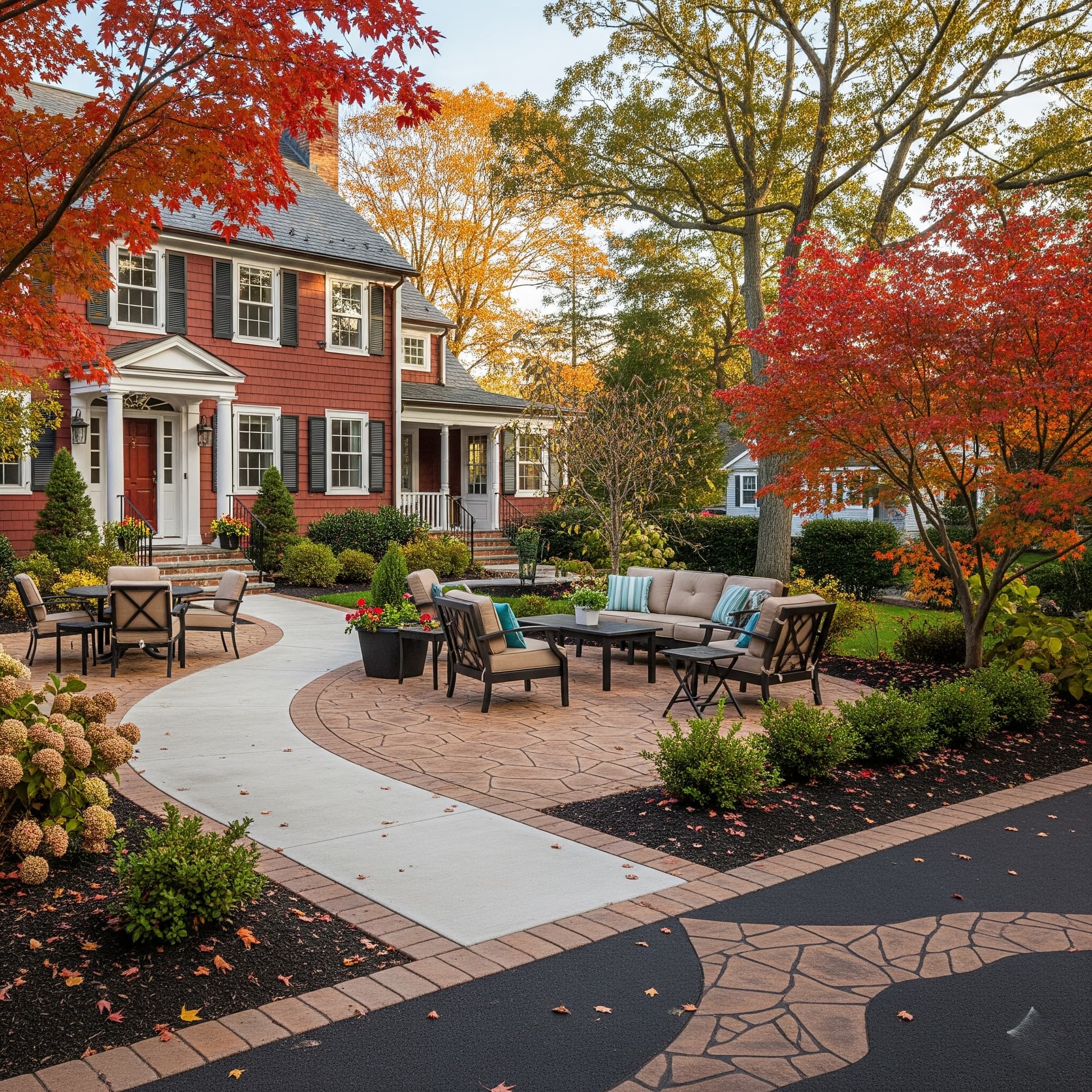
Cost & ROI of Decorative Concrete Upgrades for Boston Homes
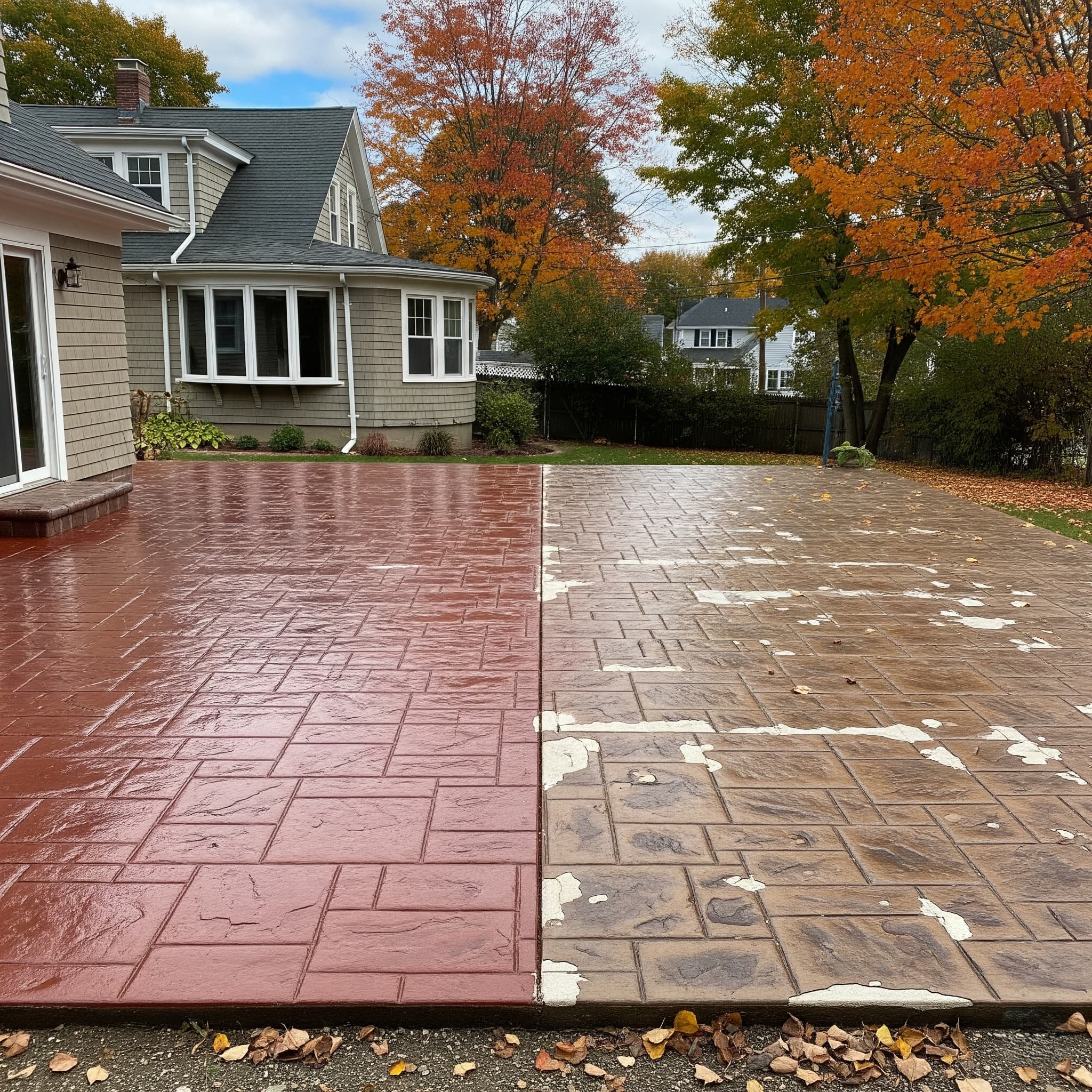
Stamped Concrete Mistakes to Avoid in Wet/New England Climates
